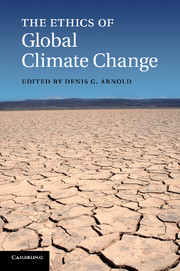Book contents
- Frontmatter
- Contents
- List of illustrations
- List of contributors
- Acknowledgements
- Introduction: climate change and ethics
- 1 Energy, ethics, and the transformation of nature
- 2 Is no one responsible for global environmental tragedy? Climate change as a challenge to our ethical concepts
- 3 Greenhouse gas emission and the domination of posterity
- 4 Climate change, energy rights, and equality
- 5 Common atmospheric ownership and equal emissions entitlements
- 6 A Lockean defense of grandfathering emission rights
- 7 Parenting the planet
- 8 Living ethically in a greenhouse
- 9 Beyond business as usual: alternative wedges to avoid catastrophic climate change and create sustainable societies
- 10 Addressing competitiveness in US climate policy
- 11 Reconciling justice and efficiency: integrating environmental justice into domestic cap-and-trade programs for controlling greenhouse gases
- 12 Ethical dimensions of adapting to climate change-imposed risks
- 13 Does nature matter? The place of the nonhuman in the ethics of climate change
- 14 Human rights, climate change, and the trillionth ton
- Select bibliography
- Index
- References
5 - Common atmospheric ownership and equal emissions entitlements
Published online by Cambridge University Press: 11 April 2011
- Frontmatter
- Contents
- List of illustrations
- List of contributors
- Acknowledgements
- Introduction: climate change and ethics
- 1 Energy, ethics, and the transformation of nature
- 2 Is no one responsible for global environmental tragedy? Climate change as a challenge to our ethical concepts
- 3 Greenhouse gas emission and the domination of posterity
- 4 Climate change, energy rights, and equality
- 5 Common atmospheric ownership and equal emissions entitlements
- 6 A Lockean defense of grandfathering emission rights
- 7 Parenting the planet
- 8 Living ethically in a greenhouse
- 9 Beyond business as usual: alternative wedges to avoid catastrophic climate change and create sustainable societies
- 10 Addressing competitiveness in US climate policy
- 11 Reconciling justice and efficiency: integrating environmental justice into domestic cap-and-trade programs for controlling greenhouse gases
- 12 Ethical dimensions of adapting to climate change-imposed risks
- 13 Does nature matter? The place of the nonhuman in the ethics of climate change
- 14 Human rights, climate change, and the trillionth ton
- Select bibliography
- Index
- References
Summary
In this chapter, I assess the view that every person shares in a common property right to the Earth's atmosphere. This view is advocated by some environmental non-governmental organizations, which take it as the philosophical basis of the claim that every person has an equal entitlement to emit CO2. For the sake of simplicity I shall limit my focus in this chapter to CO2 emissions without assuming that CO2 is the only important greenhouse gas. The common atmospheric property rights view has received little careful scrutiny in the emerging philosophical debate on climate change and justice. I hope to contribute to remedying that.
In the next section, I discuss the relationship between the common atmospheric property rights view and three different traditions of liberalism that take rights seriously. I argue that the view is plausibly entailed by two versions of Lockean (libertarian) liberalism. Common property rights in the atmosphere have a weaker foundation in egalitarian liberalism despite the endorsement of an equal entitlement to emit CO2 by some egalitarian liberals. I then argue that the common atmospheric property rights claim is prima facie consistent with egalitarian liberalism.
The second section takes up CO2 emissions and intergenerational justice. It argues that avoiding intergenerational injustice, as understood according to the common atmospheric property rights view, requires either institutions that enforce emissions limits at a rate which is less than what the climate system can absorb without creating perturbations in the climate system or institutions that make appropriate compensatory intergenerational transfers for the failure to limit emissions sufficiently.
- Type
- Chapter
- Information
- The Ethics of Global Climate Change , pp. 104 - 123Publisher: Cambridge University PressPrint publication year: 2011
References
- 15
- Cited by

